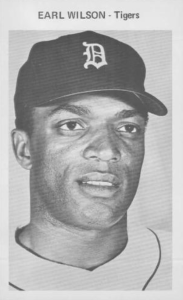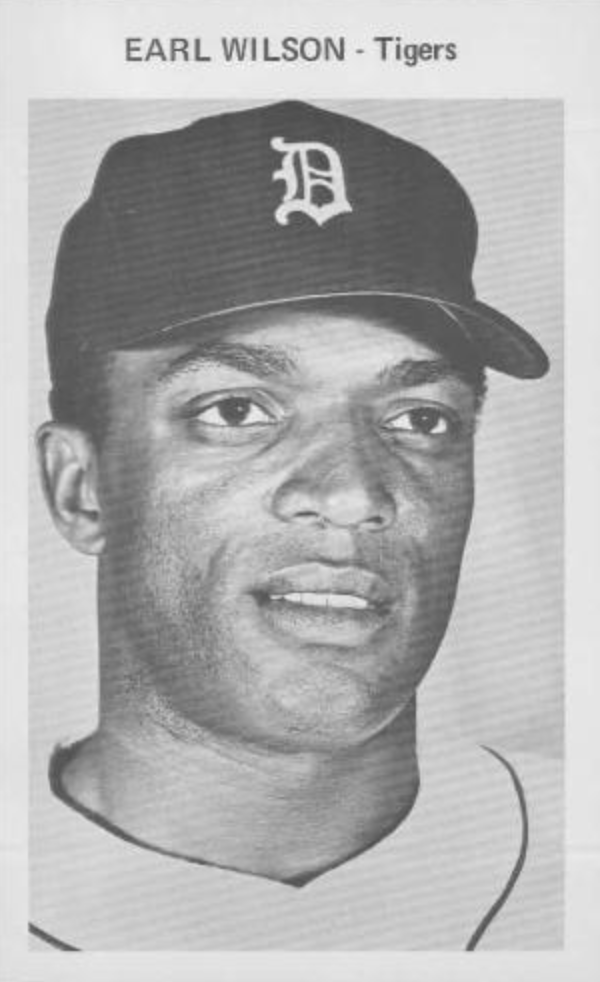April 25, 1970: Earl Wilson nearly achieves a ‘Little League home run’ after striking out
 A key cog in Detroit’s starting rotation since the mid-1960s, Tigers pitcher Earl Wilson headed into the 1970 campaign having posted the fourth-most wins among all American League hurlers since 1962 – including a league-leading 22 victories in 1967. Additionally, the big right-hander could provide rare offensive punch from his position. Frequently used as a pinch-runner and pinch-hitter, Wilson ranks among the best-hitting pitchers of all time in tallying 35 home runs and 7.3 offensive wins above replacement during his career.1
A key cog in Detroit’s starting rotation since the mid-1960s, Tigers pitcher Earl Wilson headed into the 1970 campaign having posted the fourth-most wins among all American League hurlers since 1962 – including a league-leading 22 victories in 1967. Additionally, the big right-hander could provide rare offensive punch from his position. Frequently used as a pinch-runner and pinch-hitter, Wilson ranks among the best-hitting pitchers of all time in tallying 35 home runs and 7.3 offensive wins above replacement during his career.1
During a 2019 discussion with the slugging pitcher’s former rotation mate, Denny McLain, sportscaster Bob Page said succinctly when reflecting on Wilson’s success with the bat: “He was awesome!”2 While facing the Minnesota Twins on the afternoon of April 25, 1970, however, it was Wilson’s failure with the bat that set in motion one of the strangest plays in major-league history.
The American League East-leading Tigers, celebrating the anniversary of their 70th season as an American League team, brought an eight-game winning streak into Metropolitan Stadium to face the Twins, who themselves were only a half-game back in the AL West. Played in front of 11,095 spectators, the game featured a fine pitching matchup with Wilson squaring off against ace Minnesota left-hander Jim Kaat.
The contest got off to a slow start, with neither team able to cross home plate heading into the fourth inning. Wilson had allowed only one Twin to reach base. Kaat, on the other hand, had survived constant trouble by forcing Detroit into inning-ending double plays in each of the first three innings.
After Kaat was able to set the Tigers down in order to begin the fourth, Minnesota broke through against Wilson in the bottom of the inning with two solo home runs to nearly the same spot down the right-field line off the bats of Tony Oliva and Rich Reese.3 Things settled down again in the fifth, with neither team mustering a serious scoring threat. Leading off the top of the sixth, Mickey Stanley got the Tigers on the scoreboard when he slugged one of Kaat’s offerings into the left-field seats to cut Minnesota’s lead to 2-1. Although Kaat allowed two more baserunners in the inning, he escaped without further damage. Wilson retired the side in order in the bottom of the inning to hold the Twins to their precarious one-run lead heading into the seventh.
The top of the seventh began uneventfully, with Kaat retiring the first two Tigers batters on groundouts. Wilson was the next to step into the batter’s box. The hurler had doubled earlier in the game, but this time he swung and missed at strike three. With the inning seemingly over, Twins catcher Paul Ratliff innocuously rolled the ball back to the mound as he and his teammates exited the field. Even the television network broadcasting the game cut away to commercials, leaving viewers unaware of the chaos that was about to ensue.4
As it turned out, Ratliff did not cleanly catch strike three; he trapped the ball in the dirt, allowing the batter by rule to run for first base. “I didn’t know you had to tag the runner in that case,” admitted the Twins’ rookie backstop.5 Although first-base umpire Marty Springstead signaled the correct call, only Tigers third-base coach Grover Resinger apparently noticed. “Resinger saw Springstead give the safe sign,” said third-base umpire Larry Napp. “He told Wilson to stay put and let the Twins get off the field. It was a smart play on his part.”6 Indeed, most of Minnesota’s players were already in their dugout when Resinger vociferously instructed Wilson to run. The 6-foot-3, 216-pound pitcher was already past first base and advancing to second before Twins left fielder Brant Alyea alertly realized what was happening. Located near first base on his way in from the outfield, Alyea took action. “I saw him going to second so I tried to scoop up the ball and head him off at third,” he said. “But when I went to scoop it up, I missed it.”7 This miscue allowed Wilson to chug around third base and head for home at the urging of a frantic Resinger. By this time, however, Alyea was able to backtrack to the loose ball and throw it to shortstop Leo Cardenas, who had converged upon home plate along with a “reception party” of Twins players.8 Now caught in a pickle, the “exhausted, bewildered” Wilson attempted to retreat to third base but was tagged out by Alyea, who had taken the return throw from Cardenas.9 “There were a lot of people standing around home plate – I saw one Twin player there but I thought he was a coach,” said Wilson. “I was halfway home before I realized he wasn’t and by then I was trapped.”10 Once the dust settled on the play, an error was charged to Ratliff and an improbable K767 (dropped third strike with the putout from the left fielder to the shortstop to the left fielder) was recorded in the scorebooks.
The weird play – called by Twins manager Bill Rigney “one of the daffiest” he had ever seen –resulted in some serious implications for the rest of the game.11 Rigney protested the fact that Resinger had entered the field during the play without penalty to cheer Wilson on. “I wanted to find out what Resinger is doing on the field,” the Twins manager said. “He was out on the mound. I wanted to know why Wilson wasn’t out just because Resinger is interfering.”12 Home-plate umpire John Rice acknowledged that Resinger was indeed on the field – but not near the mound. “The rule says a coach cannot physically assist a player,” Rice explained. “Resinger was not physically assisting Wilson.”13 Although Minnesota was unharmed on the scoreboard by the crazy play, “several minutes of explanations, discussions, and arguments” resulted in the ejection of Twins veteran reserve slugger Bob Allison.14 Most importantly, however, Wilson – who had allowed only three hits in six innings – was also lost due to a pulled hamstring in his left leg that he suffered while rounding the bases.
Reliever Tom Timmerman replaced the injured Wilson in the bottom of the seventh and set down the Twins in order, while Kaat likewise shut down the Tigers 1-2-3 in the top of the eighth. Leading off the bottom of the eighth for the Twins, Ratliff doubled and Frank Quilici singled. This set the table for Kaat, who helped his own cause with a sacrifice fly to center, scoring Ratliff and providing Minnesota with a much-needed insurance run heading into the final stanza.
With Detroit now trailing 3-1 in the top of the ninth, heavy-hitting Willie Horton offered a glimmer of hope with his leadoff single. Two batters later, Jim Northrup drove him in with a triple that got past center fielder Cesar Tovar, who failed in his attempt to make a shoestring catch. “I always catch that kind of ball, but I know now I should have played it safe,” admitted Tovar.15 With one out and the tying run on third, both teams made strategic changes. Right-handed Twins reliever Stan Williams was brought in to face right-hander Elliott Maddox. Detroit countered by swapping Maddox for dangerous left-handed pinch-hitter Norm Cash, who promptly tied the game at 3-3 with a sacrifice fly scoring Northrup. Williams then ended the inning on Cesar Gutierrez’s groundout.
Timmerman remained on the mound to face the Twins in the bottom of the ninth and retired the first batter, Cardenas, on a groundout. Oliva followed with a single and went to second when the normally sure-handed right fielder Al Kaline misplayed the ball. “The grass is new in right field,” Oliva said of the poor turf conditions. “I knew that Al Kaline would have trouble handling the groundball I hit to him.”16 With a runner in scoring position and pull-hitting right-hander Harmon Killebrew coming to the plate, the Detroit infield employed the “Killebrew Shift.”17 The defensive strategy backfired, however, as the Twins slugger bounced a single – “like it had radar to guide it” – in the hole between first and second that scored Oliva to give Minnesota a 4-3 walk-off victory.18 “That doesn’t happen much more often than a batter striking out and finally being tagged out at third,” quipped sportswriter Jon Roe of Killebrew’s unlikely opposite-field hit.19
The lingering buzz from the near “Little League Home Run” largely overshadowed the Twins’ victory and left Wilson still baffled after the game. “I don’t know what happened,” he admitted of his extra-base strikeout.20 “I’ve never seen one like this, never been involved in one where a guy is running around the bases after the inning is over,” said Alyea, whose delinquency in returning to the dugout helped him make the putout on Wilson – and made him fodder for wisecracks.21 “If Alyea had been hustling, Earl might have made it,” joked Tigers catcher Bill Freehan. “Tell him to start coming in and off the field a little quicker.”22
Sources
The author accessed Baseball-Reference.com (baseball-reference.com/boxes/MIN/MIN197004250.shtml) for box scores/play-by-play information and other data as well as Retrosheet (retrosheet.org/boxesetc/1970/B04250MIN1970.htm). In addition to the sources cited in the Notes, the author also accessed GenealogyBank.com; NewspaperArchive.com; Newspapers.com; and Paper of Record.
Notes
1 Wilson’s home runs and wins above replacement (WAR) reflect those he achieved as a pitcher, pinch-hitter, and pinch-runner. His WAR uses the Baseball-Reference calculation methodology.
2 Bob Page, “Episode 80: Ty Cobb to Denny and HIS Generation: You Guys Suck!” No Filter Sports with Eli Zaret, Denny McLain & Bob Page (Red Shovel Network), podcast audio, nofiltersportspodcast.com/2019/10/14/episode-80-ty-cobb-to-denny-and-his-generation-you-guys-suck/, October 14, 2019.
3 Jon Roe, “Twins Win 4-3 in Ninth,” Minneapolis Tribune, April 26, 1970: 51.
4 Dave Wright, 162-0: Imagine a Twins Perfect Season (Chicago: Triumph Books, 2010): 32.
5 Mike Lamey, “Wilson Gets Three Bases on Whiff,” The Sporting News, May 9, 1970: 25.
6 “Out Is an Out Is Finally an Out,” Minneapolis Tribune, April 26, 1970: 1S.
7 “Out Is an Out Is Finally an Out.”
8 Lamey.
9 Jim Hawkins, “Tiger Win Streak Ends at 8,” Detroit Free Press, April 26, 1970: 1D.
10 Jim Hawkins, “‘Grover Said Run, So I Ran’ – Wilson,” Detroit Free Press, April 26, 1970: 1D.
11 Associated Press, “Tiger Win Streak Snapped at Eight,” Times Herald (Port Huron, Michigan), April 26, 1970: 1D.
12 “Out Is an Out Is Finally an Out,” Minneapolis Tribune, April 26, 1970: 10S.
13 “Out Is an Out Is Finally an Out.”
14 Hawkins, “Tiger Win Streak Ends at 8.”
15 Roe.
16 Sid Hartman, “Sid Hartman,” Minneapolis Tribune, April 26, 1970: 3S.
17 Roe.
18 Hawkins, “Tiger Win Streak Ends at 8.”
19 Roe.
20 Lamey.
21 Associated Press, “Tiger Win Streak Snapped at Eight.”
22 Lamey.
Additional Stats
Minnesota Twins 4
Detroit Tigers 3
Metropolitan Stadium
Bloomington, MN
Box Score + PBP:
Corrections? Additions?
If you can help us improve this game story, contact us.


